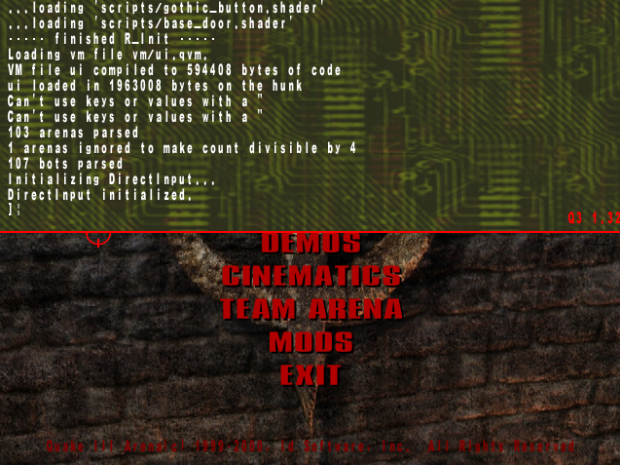Ingame consoles have several usages: game logging, debug, commands…
In yahtr, I was losing some time constantly switching from the game to the System Console so I decided to do something for the long run and build an ingame console! With it I will be able to see my logs directly ingame, and afterwards, execute commands in it.
This post will be separated in 2 parts: how to feed the console and how to display it.
Here is an example of the console in a Quake game.

How to feed the console
I chose to use the Python logging system, because it’s widely used, very practical and I also found out that it’s very open! If you don’t know this module, I highly suggest that you check the doc and use it in your projects! You won’t regret it!
From here, two options can be explored:
- Create a specific logging handler that will take care of the log records directly
- Create an agnostic logging handler that will fire an event when a log record needs to be handled
Obviously I chose #2 since I don’t want to be dependant on my UI system. That said, you can find an example of #1 on Stack Overflow.
Loggers architecture
Before diving into the details, remember that Python loggers can be hierachical:
import logging
root_logger = logging.getLogger()
child_logger1 = logging.getLogger('child')
child_logger2 = root_logger.getChild('child')
assert child_logger1 is child_logger2
The advantage of hierachical loggers is that children share the same properties as their parents (if not overriden of course). So let’s prepare some loggers:
# --- log.py
import logging
# parent logger for application related logs
# targeted to the system console
app_logger = logging.getLogger('app')
# parent logger for game related logs
# targeted to the ingame console AND will inherit from the app_logger handling (system console)
game_logger = app_logger.getChild('game')
# --- loading.py
from log import app_logger
loading_logger = app_logger.getChild('loading')
# --- battle.py
from log import game_logger
battle_logger = game_logger.getChild('battle')
Loggers handling
Now this is a great way to organize loggers but it lacks the main part for our topic: the handler(s)…
The app_logger will be handled by the basic StreamHandler while the game_logger will be handled by a custom handler which job is to fire events with the handled record.
import logging
import logging.handlers
from utils.event import Event
class GameConsoleHandler(logging.Handler):
def __init__(self, level=logging.NOTSET):
logging.Handler.__init__(self, level=level)
self.on_message = Event('message')
def emit(self, record):
msg = self.format(record)
# Broadcast the formatted message
self.on_message(msg)
game_console_handler = GameConsoleHandler()
app_logger = logging.getLogger('app')
app_logger.addHandler(logging.StreamHandler())
game_logger = app_logger.getChild('game')
game_logger.addHandler(game_console_handler)
As you may have noticed, I use the Event class from my previous post . Feel free to use another event-based system instead.
The Kivy case
Kivy uses the official Python logging module as well, and you may need to tweak the previous code depending on your needs. Indeed, if you don’t want to use the kivy Logger, you’ll need to get a child from the root logger because, for some reason, the Kivy logger is set as the root.
Here is the final code for this part:
import logging
import logging.handlers
from utils.event import Event
class GameConsoleHandler(logging.Handler):
def __init__(self, level=logging.NOTSET):
logging.Handler.__init__(self, level=level)
self.on_message = Event('message')
def emit(self, record):
msg = self.format(record)
# Broadcast the formatted message
self.on_message(msg)
game_console_handler = GameConsoleHandler()
app_logger = logging.getChild().getLogger('app') # taking the root's child
app_logger.addHandler(logging.StreamHandler())
app_logger.propagate = False # don't propagate to kivy's logging system
game_logger = app_logger.getChild('game')
game_logger.addHandler(game_console_handler)
This concludes this first part!
Fabien.